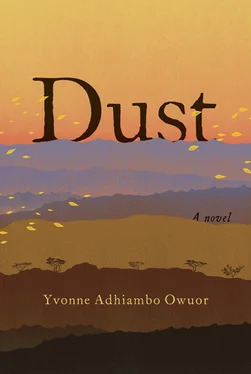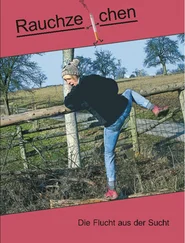Silence.
Petrus watches the flaring red end. “So — what’s your death for?” he asks.
Smoke rings. “I choose one star to give it to.” A snort. “You’d say country .”
Petrus blinks. It was true.
The Trader asks, “Intelligence?”
“Mhh.”
“Ghana-trained,” says the Trader. “First car, Renault Roho.”
“How do you know?”
“A patriot.” A giggle. “My advice? Find another god to serve.”
“Kenya’s my father’s patrimony.” A pause. “Trade unionist, like Mboya. Mombasa. Hung by the Crown. Died for this country. Yes, I’m a patriot.”
The Trader wheezes, “Nobody remembers him, intelligence man. Your country pumps biogas into other balloon ghosts to elevate and worship, thee-thee-thee !”
Sheen on Petrus’s upper lip.
The Trader looks at his radio. He murmurs, “What to do about the world.”
Petrus grinds out, “What does it need?”
“Memory loss.” The Trader turns to Petrus, his face sunken. “Like me.”
Petrus sets his rifle’s sights, adjusts the elevation until the Trader is perfectly framed.

Wind flings dust. Heat boils Galgalu’s body. Several heartbeats later, an explosion. Then three more in succession. The wind snatches the fireball and scatters the flames across the land. Galgalu runs out of the car. Dashes to and fro. Stops.
What a willful presence is fire. It disarrays the terrain.
Petrus reappears, the rifle dangling from his left hand. It is a little past noon, and time is an intense blue. Petrus asks, “You know where the Trader lives?”
Galgalu points northward.
They drive off.
The fire behind them falls upon life, a maniacal omnipresence.
Before the last light of day, they enter the Trader’s homestead. Petrus hurries into the compound, knocking things down, kicking objects in all directions. He breaks down the flimsy entrance and from within comes the clang-bang-tumble of a tukul being ransacked. Scent of coffee blends. Galgalu follows. Petrus reaches into the roof, pulls out sealed packages. Freedom in chaos. Together, they pulverize things, they eradicate proof of existence. Galgalu — lost to the frenzied clearing, gasping, hungering, strong beyond his previous knowledge — uses his bare hands to break a wooden Lamu chest. They empty the Land Rover’s three jerricans of petrol in and around the tukul . Galgalu is aroused after Petrus tosses three matches on the ground and fire explodes. He is ashamed, but only for a second. He laughs out loud.
Three hours later, a high-keening d’abeela creeps into the Trader’s emptied compound. He stamps out the lingering flames. Wipes his eyes. He sniffs burned coffee remnants. Plowing through the Trader’s goods, he salvages a charred guitar.

Galgalu says, “There was a fire; it ate everything.”
Nyipir asks, “Yes?”
“Even the Trader.”
“You saw him?”
“No.”
“He’ll return,” Nyipir replies.
“I tell you, there was a fire,” explains Galgalu.
Petrus Keah shivers and sweats in Nyipir’s bed under the spell of malaria. His cells suffocate under a concoction made of neem and baobab and crushed roots, which Galgalu ladles down his throat. Malaria’s hallucinations parade in Petrus’s being, and it becomes normal for Wuoth Ogik to be shaken by his shrieks.
Tending to Petrus gives them something to do. And when his fever breaks, it is as if a soft and tender wind has visited Wuoth Ogik.

Petrus has taken to sitting on Odidi’s cairn to watch the land. A state of partial dress — shirt buttons undone, hair uncombed, Nyipir’s tyre sandals on his feet. He smiles at stones, trees, insects, birds, at clouds and at the sun. At intermittent moments his shoulders move like pistons for no clear reason. Unseen by Petrus, Ajany sketches a hazy impression of him. Galgalu crouches next to her, studying Petrus.
Ajany purses her lips. “What’s he laughing at?
Galgalu suggests, “It’s malaria.”
He adds, voice low, “There was a fire. It left nothing. Even the Trader’s gone.”
Ajany tilts her green-tinged image of Petrus.
Galgalu touches it. “What else can you see?”
They watch Petrus.
Ajany’s hand starts to draw outward. Lines, curves, dips, and contours become a likeness of Isaiah. Ajany sees what she has done. She stops. Galgalu watches as she scribbles the image away until there is only a dark blob on the paper. She tears out and scrunches up the paper. Galgalu hears Petrus laugh. He also remembers the fire, that it ate everything.
Nyipir sidles up to Petrus, holding two tin mugs of spiced coffee. Handing Petrus one, he asks, “Inyiero?” Laughter?
Nyipir stoops, scanning Petrus for evidence of lunacy.
“Life,” Petrus answers. Petrus says, “Life is presence.”
“Yes?”
Petrus says, “You saved me.”
“You may thank me,” Nyipir replies.
“But I won’t, msee .”
Nyipir sips his coffee.
They both study the land.
What accounts for your life? Petrus asks passing clouds in his thoughts. He lowers his cup, digs out his cigarette packet, unwraps the single cigarette, sniffs it, and with a small twitch dangles it on the tip of his lips.
Nyipir steps closer to Petrus, opening his mouth to ask, On what side of the oath do you stand? He closes it.
Petrus then tilts his head away from the sun’s glare.
He pauses mid-movement, gaze trapped by the shape of Nyipir’s left hand, the twisted fingers, the protruding, black stumpy-nailed thumb. In slow motion, he raises his right hand and watches as his fingers wrap around Nyipir’s hand.
Nyipir jerks backward.
Eyes wet, he faces eastward.
A hesitation.
But then his hand closes over Petrus’s.
The day’s hard light toasts their skin. Petrus chews hard on his cigarette end. Fresh wrinkles wreathe his face. His unlit cigarette falls and, like soft November rain beginning to fall, his tears create an inkblot on the earth’s surface.
Later.
“I’m wondering,” Nyipir says as he watches the regress of a column of safari ants. “Mandalay, 21° 59′ N 96° 6′ E, Rangoon, 16° 47′ N 96° 9′ E.”
“Yes?” Petrus rubs his spectacles.
“Burma.”
“Myanmar, osiepna . And Rangoon is Yangon .”
“So my daughter says. She’s very clever.”
Petrus squints at the light on faraway mountains.
Nyipir says, “A place to see. Burma.”
Three pairs of ibis squawk their way home. Petrus studies their flight route. Dropping rules. Escaping dutifulness, he grabs at the offer of a trail of friendship. Atonement? His eyes pop, lift, and meet thick brows. “Msee,” Petrus asks, surrendering to his craving, “do you have fire to lend me?”
Unknown and unseen wanderers have added stones to Wuoth Ogik’s new graves. Nyipir counts these, seven. He also counts the cigarettes he and Petrus have shared in life. This last one was their second.
WATERING HOLES ARE LITTERED WITH MEMORY CIPHERS. CATTLE bones — casualties of past droughts, a prevailing north wind. Ali Dida Hada asks after a red dance-ox. Wanderers tell him where they have seen it, marveled at its trained, polished horns, lofty temperament, and majestic amble. Following the trail, he and Isaiah reach a cross-shaped boulder in a wadi.
A pale tree stump, dry and carved by water, leached by sun, warped into a humanlike face with its nose pointing north in the direction of the water’s flow. Its shorn branches point skyward. Ali Dida Hada strokes the bark. He rocks it until the loam loosens. Above, sulky clouds approach in phalanx. Ali Dida Hada murmurs, “Rain.” The tree stump rolls forward. “It’ll flow.” He watches the wind bend the low-lying, yellowed grass.
Читать дальше












